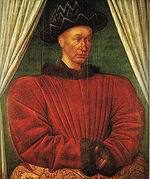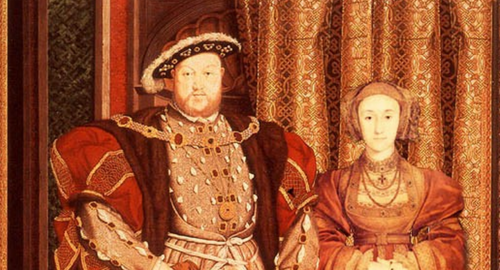-
Today in Tudor History...
1429 – Hundred Years' War: Charles VII of France is crowned the King of France in the Reims Cathedral after a successful campaign by Joan of Arc

1453 – Death of John Talbot, 1st Earl of Shrewsbury, English commander

1517-"The christening of the Lady Frances, first begotten daughter of Charles Duke of Suffolk and Mary the French Queen."
Born at Bishop's Hatfield, Thursday, 17 July 1517, 9 Hen. VIII., between 2 and 3 in the morning. Christened on Saturday following. The road to the church was strewed with rushes; the church porch hung with rich cloth of gold and needlework; the church with arras of the history of Holofernes and Hercules; the chancel, with arras of silk and gold; and the altar with rich cloth of tissue, and covered with images, relics, and jewels. In the said chancel were, as deputies for the Queen and Princess, Lady Boleyn and Lady Elizabeth Grey. The Abbot of St. Alban's was godfather. The font was hung with a canopy of crimson satin, powdered with roses, half red and half white, with the sun shining, and fleur de lis gold, and the French Queen's arms in four places, all of needlework. On the way to church were eighty torches borne by yeomen, and eight by gentlemen. The basin, covered, was borne by Mr. Sturton, the taper by Mr. Richard Long, the salt by Mr. Humphrey Barnes, the chrism by Lady Chelton. Mrs. Dorothy Verney bore the young lady, was assisted by the Lord Powes and Sir Roger Pelston, and accompanied by sixty ladies and gentlemen, and the prelates Sir Oliver Poole and Sir Christopher, and other of my Lord's chaplains. She was named Frances, being born on St. Francis's day.

1529-THE DIVORCE.
Memorandum that, at the King's command, 17 July 21 Hen. VIII., John abbot of Westm., Dr. Burbank and Dr. Higgons received out of the Treasury of the Receipt four writings:—one with four seals in wooden boxes;† another, with a seal of the Spanish arms, subscribed in the Queen's hand, Katherina princeps Walliæ; another, with a little seal, endorsed, Signum indorsatum in capsa Hispaniæ Arragoniæ;† and another, sealed with the English seal, endorsed as the last. Receipt by Ric. Sampson for the four pieces from Ric. Warner, under-chamberlain of the Treasury. Signed.
P. 1. On the dorse: Receipt by Sampson for a paper relating to the treaty of marriage between Henry prince of Wales and Katherine, daughter of Ferdinand and Isabel, and a commission from Spain relating to the marriage.
1531-Chapuys to Charles V.
The Queen has kept the articles last sent from Rome till the day before yesterday, in the hope of assembling all those of her Council, which she has found to be impossible, and has accordingly sent them back to me. On considering them, it seems to me that there has been omitted one deduction so necessary that without it conclusive proof cannot be obtained, because the point is to show that the Queen was not known by prince Arthur, which is a general negative without restriction of time or place, a thing in law unprovable, and the presumption is against her, as she lay with the said Prince several nights, and moreover they have brought testimony here that the Prince had several times boasted of having used her like a true and vigorous husband. For these reasons, even if all the Queen's allegations were proved, as set forth in those articles, it would not amount to perfect proof, except by the Queen's oath, which could not be admitted by law in opposition to the said proofs and presumptions. It should therefore be expressly stated in articles, how the said Queen is so virtuous, devout, truthful, and God-fearing that for nothing in the world would she declare a falsehood, and that she would rather die than perjure herself to the injury of any one, especially in order to live in incest, which would be the case if those things were proved. This would do away with all the rules and presumptions of law. I write of it to Mai, and if it be approved by your Majesty's council, I beg you to write to him. We are continually endeavouring here to obtain witnesses informed of the whole case, and have got two, who depose well au possible, whom I have got examined by the Nuncio, by virtue of a secret commission from his Holiness, and the Nuncio will send their testimony with those of the other two who have already deposed.
The Queen has been for some months living in hope that the process would be settled before the re-assembling of Parliament; but now she is quite depressed, seeing that the Pope shows no good will to do her justice. Moreover, it seems that he only delays the affair to open the door to improper practices (inconvenientz). She sees also that the lady and others of that party speak with greater assurance than they used to do, and the King makes difficulties only that the cognizance of the cause may be remitted to England. He has already the opinion of the university of Orleans, as Sampson declares, that the matter should be discussed here, and that the Pope has no right to interfere with it. I think Dr. Fox will solicit those of Paris to conclude the same. I have warned your Majesty's ambassador in France to be on his guard about it, and it is more important now than when the principal article was discussed, that Mai and the others be careful to hinder their practices; for if the King obtained the decision of three or four universities, conformable to that of Orleans, the Queen's case would be half desperate, and there would be no bishop who would refuse to give sentence according to the King's wishes. The lady only allows three or four months for the nuptials. She is preparing her state royal by degrees, and has just taken an almoner and other officers. She goes along with the King to the chase; and the Queen, who used always to follow, has been commanded by the King to stay at Windsor. This very much aggravates her regret, as well because the King is so distant, as because she thinks that he will have a better opportunity of gaining the lords in those districts through which he passes, and inducing them to espouse his side in Parliament.
Yesterday he sent a post to Rome, who was to have carried a very tortuous despatch, for they detained him more than ten days, whilst they were in great deliberation about it. I thought to learn something of it from Joachin, who said to me, that, whatever fair face they show him here, they did not tell him anything, except what they thought was for their own advantage, and in the end they remained English, and he French. He has been more friendly with me than usual. I will give him occasion to continue so. He has told me that the King has several times expressed his wish for the Council, and that he will attend it in person if the place be suitable, for without the personal assistance of princes he thought it would only end in confusion; and such was the opinion of Francis. These are lessons they have rehearsed between them.
I think that the duke of Norfolk is offended that he sees no chance of your confirming or paying his pension, and he finds France more to his taste. Joachin has just given him three horses and three stags. He complains of the men of Gravelines, who want to usurp a certain piece of land within their limits. The young Marquis [Dorset] has been forbidden to go to Court for some time, because he has been charged with assembling the people of Cornwall and the neighbourhood. The Queen thinks this is an invention of the lady, because the Marquis is her humble servant. For the same reason, and to avenge herself on the duke of Suffolk, who had heretofore made some charge against her honor, the same lady has accused him of having connection with his own daughter. I know not what will follow from it.
Wishes to know if he is to correspond with the queen of Hungary, and begs he may have some vacant benefice. London, 17 July.
1540-Anne of Cleves to Henry VIII.
Thanks him for his goodness, favour, and liberality, declared by the King's own letters and the report of the Great Master, the Privy Seal and Secretary. Will ever remain his sister and servant, according to her answer made at the first opening of this matter, from which she has never varied nor will vary. If anyone has said the contrary it is without her consent. Richmond, 17 July. “sister and servant”

source:http://www.british-history.ac.uk/
